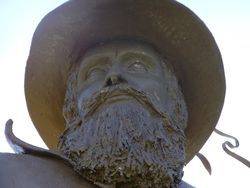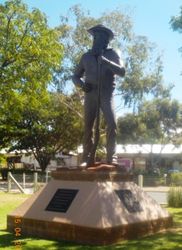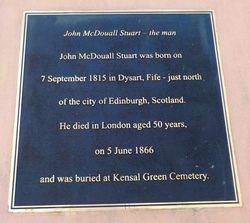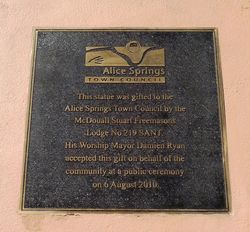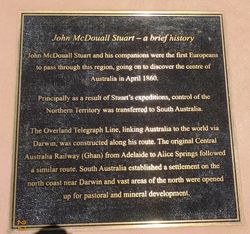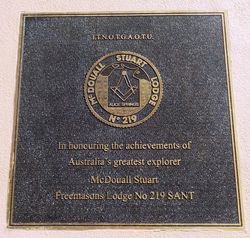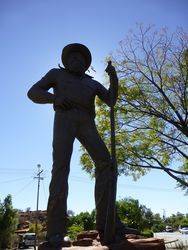
John McDouall StuartPrint Page 
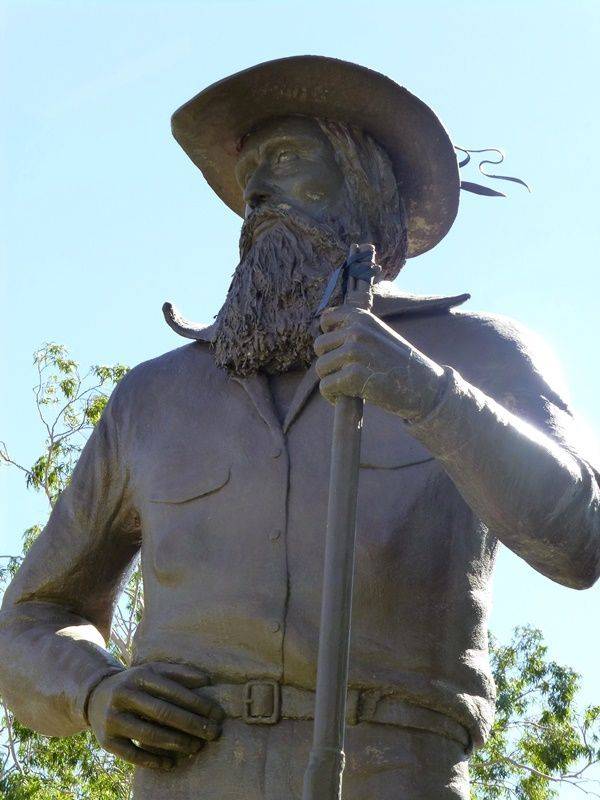
The controversial sculpture of John McDouall Stuart was gifted to Alice Springs by the local Freemasons Lodge to commemorate 150 years since Stuart first reached the area. The statue was originally unveiled in 2010 and the work was quickly moved into storage after concerns were raised that the council had not followed proper procedure for public art as well as complaints from local Aboriginal people. The statue was placed in Stuart Park on the 23rd July 2014.
In the imposing four-metre high statue, Stuart is portrayed holding a rifle, a prop that sits as an awkward reminder of the often-violent history of Aboriginal-settler relations and unacknowledged frontier wars. It is not helped by the fact Stuart’s own diary records an incident with a local Aboriginal group during his 1860 voyage which appears to have left several dead.
The South Australian Government was keen to open a route from Adelaide to the north coast and offered a reward of $4,000 to the first person to achieve it. In 1860, Stuart, accompanied by William Kekwick and Ben Head, set out on their first attempt. The party reached Attack Creek, north of Tennant Creek, before being forced back through lack of supplies and hostile aboriginals on June 27th 1860. Stuart, with Kekwick and 10 others, set out again on New Year`s Day 1861, and reached Newcastle Waters, but was again forced to return, this time because of the dense bushland. They left Adelaide again in December, 1861 and seven months later, on July 24th 1862, finally reached the north coast at a place which they named Chambers Bay, after a sponsor of their expeditions.
Location
| Address: | Stuart Terrace, Stuart Park opposite Reptile Centre, Alice Springs, 0800 |
|---|---|
| State: | NT |
| Area: | AUS |
| GPS Coordinates: | Lat: -23.703506 Long: 133.878058 Note: GPS Coordinates are approximate. |
Details
| Monument Type: | Sculpture |
|---|---|
| Monument Theme: | People |
| Sub-Theme: | Exploration |
| Designer: | Mark Egan |
| Monument Manufacturer: | Mark Egan |
Dedication
| Actual Monument Dedication Date: | Friday 6th August, 2010 |
|---|
John McDouall Stuart - the man
John McDouall Stuart was born on 7 September 1815 in Dysart, Fife - just north of the city of Edinburgh, Scotland.
He died in London aged 50 years, on 5 June 1866 and was buried at Kensal Green Cemetery.
Alice Springs Town Council
This statue was gifted to the Alice Springs Town Council by the McDouall Stuart Freemasons Lodge No 219 SANT.
His Worship Mayor Damien Ryan accepted this gift on behalf of the community at a public ceremony on 6 August 2010
I.T.N.O.T.G.A.O.T.U.
McDouall Stuart Lodge
Alice Springs
No 219
In honouring the achievements of Australia`s greatest explorer McDouall Stuart
Freemasons Lodge No 219 SANT
John McDouall Stuart - a brief history
John McDouall Stuart and his companions were the first Europeans to pass through this region, going on to discover the centre of Australia in April 1860.
Principally as a result of Stuart`s expeditions, control of the Northern Territory was transferred to South Australia.
The Overland Telegraph Line, linking Australia to the world via Darwin, was constructed along his route. The original Central Australia Railway (Ghan) from Adelaide to Alice Springs followed a similar route. South Australia established a settlement on the north coast near Darwin and vast areas of the north were opened up for pastoral and mineral development.



